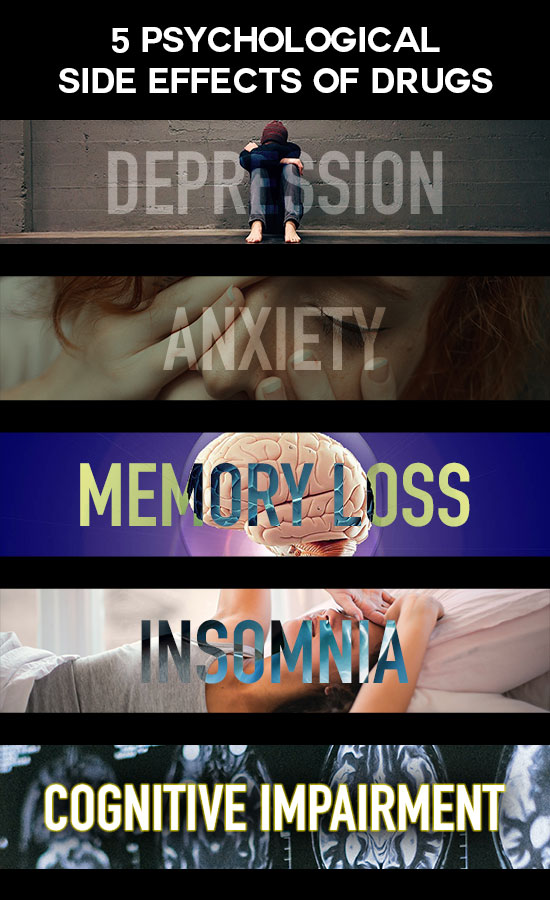
There’s a lengthy list of long-term side effects of drugs and addiction that affect both the body and mind, and many people might already be familiar with some of them.
Trying to remember when did the war on drugs start is now a distant memory that has lead to addiction across the country including an opioid and heroin epidemic.
Prolonged use of any drug can have serious physical and psychological consequences. Certain risks are greater depending on how the drug is used or ingested, such as orally like pills, inhaled like crack cocaine, or injected intravenously like heroin.
At the same time, there are often secondary side effects of drugs that exacerbate these physical and psychological side effects.
These drug side effects can be extremely dangerous and might possibly cause permanent damage or even death.
Fortunately, there is hope with drug addiction treatment and intervention. It’s important to recognize the most common drug side effects and understand how long-term drug addiction can affect the body.
Physical Side Effects of Drugs
With prolonged drug addiction, there are many long-term side effects that impact a person’s physical health, including functional and structural damage to the brain, organs, and other bodily systems.
The National Institute on Drug Abuse(NIDA) states that drug addiction can damage the gastrointestinal system, kidneys, liver, pancreas, cardiovascular system, and respiratory system.
These are all vital systems that keep an individual alive and healthy. Causing damage to these systems can be dangerous to a person’s health and be potentially fatal.
Here are common areas of the body impacted by drug side effects caused by addiction:
Side Effects of Drugs on Gastrointestinal System
Drugs that are taken orally will pass through the gastrointestinal system and can cause damage to the stomach, intestinal lining, and digestive organs. Damage to the gastrointestinal system is one of the more common side effects of long-term drug use.
Frequent diarrhea as a result of improper eating habits and intestinal disturbances is one of the first side effects to appear, which can result in severe dehydration and even malnutrition. Alternatively, the gastrointestinal system may stop working properly or become so dehydrated that it causes constipation.
Severe inflammation of the stomach lining is also possible, which can cause cramping, chronic pain, ulcers, and permanent damage. This type of problem makes it extremely difficult for the stomach to absorb nutrients.
With long-term cocaine use, side effects include damage to the pyloric sphincter, which opens and closes the opening to the stomach. This can lead to issues with acid reflux. Anyone who has ever suffered from acid reflux knows how painful this can be.
Those with severe gastrointestinal issues may experience internal hemorrhaging causes them to vomit blood. These side effects do not occur independently. Damage to this system can result in chronic inflammation, damage to the liver, kidneys, malnutrition, and more.
Long Term Effects of Drugs on the Kidneys
The kidney’s job is to remove the toxic effects of drugs from the blood stream, but long-term drug use affects how well the kidneys are able to function.
Many different types of drugs can affect the kidneys, including heroin, cocaine, alcohol, painkillers, and MDMA. Prolonged use of these drugs can cause acute kidney inflammation as a result of infection, renal infarction, kidney lesions, and kidney failure.
Overall, drug use can negatively affect the structure and function of the kidneys and result in significant health issues.
Impact of Drugs on the Liver and Pancreas
Long-term use of opioids, heroin, and alcohol are very dangerous and can cause serious health issues when used together. Combining multiple substances like heroin and alcohol is very hard on the liver and can result in liver failure from prolonged use.
Alcoholics can develop alcoholic hepatitis, which is the inflammation of the liver, and they are also at risk for cirrhosis of the liver.
Cardiovascular System Problems
Most street drugs will negatively affect the cardiovascular system, especially when used for long periods of time. These side effects can include:
- Heart disease
- Strokes
- Heart attacks
- Vascular disease
- General heart failure
Injection use of drugs can result in collapsed veins and infections, which can result in kidney damage as listed above.
Damage to the Respiratory System
When an individual inhales drugs, there is a great risk of respiratory damage. Drug use, like smoking crack and crystal meth, can cause lung cancer, chronic bronchitis, and emphysema.
Additional side effects include an increased risk of asthma and chronic obstructive pulmonary disease (COPD).
Long Term Effect of Drugs on the Brain
When we look solely at the physical side effects of drug use on the brain, we see that the brain’s structure and function change over time caused by addiction.
Brain cells can die, which ultimately causes brain damage and severe cognitive impairment. With a reduced number of brain cells, the brain connections between neurons decrease in some areas, while other areas are increased.
There are three key areas that are most affected by the side effects of drugs:
- The basal ganglia
- Amygdala
- Prefrontal cortex
The basal ganglia plays a role in motivation to the reward circuit and changes with drug use. When this happens, drug use becomes the most rewarding thing to a person, which makes it difficult for an individual to feel pleasure from anything beyond getting high.
The amygdala controls feelings like anxiety and stress. This circuit is heightened and becomes extremely sensitive with long term drug use and can leave the individual feeling very anxious and stressed, with the drug use being the only thing to provide relief from these feelings.
Lastly, the prefrontal cortex controls logical decisions, and how we think is essentially affected by long-term drug use. Drug use reduces a person’s impulse control, and can cause one to seek out more drugs to satisfy the amygdala and basal ganglia.
5 Psychological Side Effects of Drugs
The side effects of drugs go well beyond the physical body. The psychological dependence on drugs is sometimes connected to the physical effects.
The changing structure of the brain can affect our chemical balance. Drug use affects our reward system and triggers the release of dopamine and other neurotransmitters that result in euphoric feelings.
These euphoric feelings make a person want to do the drug again and again, chasing the same feeling. Eventually, dopamine production changes and the body begins to produce less of it naturally.
Other drug side effects include depression, anxiety, memory loss, lack of focus, insomnia, and cognitive impairment.

Here are 5 Most Common Psychological Drug Side Effects:
1. Depression
Depression and drug use can go hand in hand, but determining what came first can be challenging. In some instances, a person with depression may start using drugs to feel a temporary sense of relief. In other instances, the decrease in dopamine production can cause depression.
2. Anxiety
Similar to depression, a person may start using drugs because of pre-existing anxiety or, due to changes in the brain, anxiety can come as a side effect of using drugs.
Either way, a person may experience severe anxiety and panic attacks as a result of changes to the amygdala. The more prolonged the drug use is, the worse a person’s anxiety may become.
3. Memory Loss
There are two types of memory loss associated with drug use: brownouts and blackouts. These brownouts are temporary bouts of memory loss where a period in time becomes hazy.
A blackout prevents the formation of memories, and the individual will have no recollection of what happened during a period of time. Blackouts are a common side effect of alcohol abuse.
4. Insomnia
Insomnia is a common side effect of drug use and can last from a few days to several weeks. This sometimes causes an individual to use more drugs with the hope of having a sleep inducing effect. If unsuccessful, this can result in extended insomnia after the drugs wear off, and the cycle repeats itself.
Sleep is crucial to one’s health, and this disruption in sleep cycles can cause numerous health issues, both mentally and physically.
5. Cognitive Impairment
As mentioned above, with the physical effects of drug use on the brain, cell death, and decreased connections can result in cognitive impairment. As a result, a person may experience impaired judgment, confusion, poor motor coordination, lack of focus and social skills, emotional outbursts, or lack of empathy.
Secondary Effects of Drug Use
With all of the physical and psychological side effects of drugs, secondary side effects can also begin to occur.
These secondary effects can include:
- Financial challenges
- Homelessness
- Lost or strained relationships
- Unemployment
- Malnutrition
- Infection
- Contagious diseases
- The physical threat of spending time in dangerous areas or situations
It becomes obvious when reading through this lengthy list that addictive drugs can temporarily make a person feel good while simultaneously damaging the mind and body.
This feeling of euphoria, combined with physical and mental changes caused by drug use, causes individuals to crave more and more drugs just to feel normal.
By constantly chasing and craving those “feel good” experiences, the body becomes dependent, and in turn, experiences more physiological damage. It’s a cycle that continuously puts a strain on the body, causing lasting (but not always irreparable) damage.
In some cases, bodily damage can be reversed after drug use has stopped. The most permanent side effect of drug use is overdose and death.
Fortunately, there is hope, and seeking treatment can prevent death, overdose, and physical harm. Seeking treatment for drug addiction can significantly improve an individual’s physical and mental health.
Related Posts
- Triple C Side Effects and Abuse
Contrary to common misconceptions, over-the-counter drugs like Triple C are not automatically safe just because…
- Is Addiction a Disease or a Choice?
Is addiction a disease? Is alcoholism genetic? Or is it simply a personal choice? These…
- Top 10 Worst Drugs and Most Dangerous Drugs
Americans are more likely to die from drug abuse and misuse than any other preventable…
